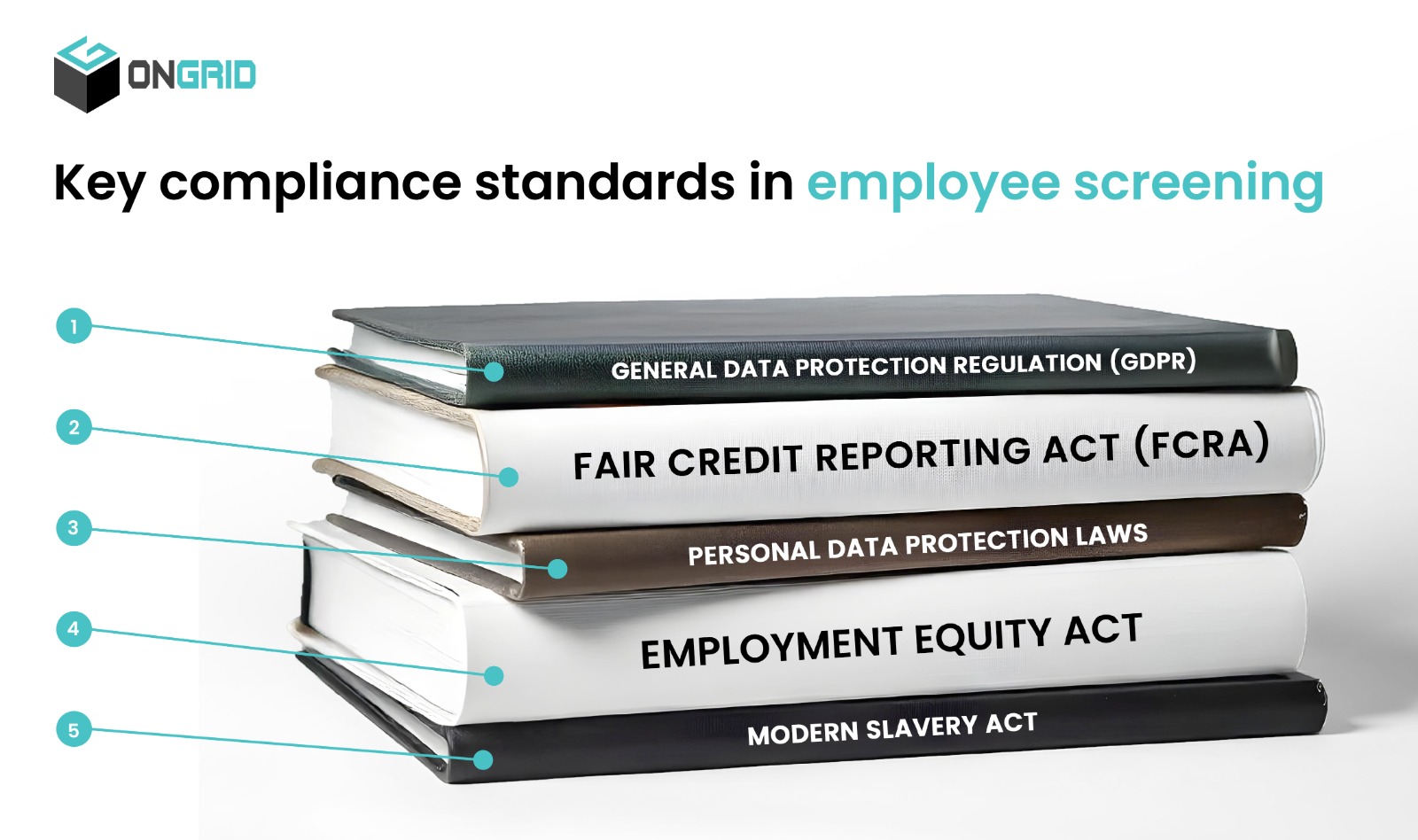Table of Contents
ToggleIn today’s globalised workforce, maintaining compliance in employee screening is crucial for ensuring both security and trust across borders. For companies, adhering to global compliance standards involves navigating a complex landscape of regulations that vary by country. Whether it’s GDPR in Europe, FCRA in the U.S., or local privacy laws in Asia, understanding and adhering to these standards helps organisations protect sensitive information, reduce liability, and uphold reputation.
Why Global Compliance in Employee Screening Matters
Employee screening compliance goes beyond ticking regulatory boxes. It’s about implementing due diligence to foster a safe, transparent, and respectful workplace. A strong compliance framework helps companies meet both local and international requirements, avoiding legal repercussions and ensuring that employees’ rights are respected. With varying data protection laws worldwide, companies need to be aware of country-specific policies to prevent mishandling of personal data.

Here’s a look at some prominent global compliance standards companies should be mindful of when screening of potential employees:
1. General Data Protection Regulation (GDPR) – EU: GDPR regulates how personal data is collected, processed, and stored in the European Union. Organisations must secure explicit consent from candidates before background checks and ensure data is used only for specified purposes.
2. Fair Credit Reporting Act (FCRA) – U.S.: In the United States, FCRA governs how background checks are conducted, requiring transparency with candidates about screening processes, clear consent, and specific procedures for dispute resolution.
3. Personal Data Protection Laws – Asia and Middle East: Countries in Asia and the Middle East have various compliance mandates such as Japan’s Act on the Protection of Personal Information (APPI) and Singapore’s Personal Data Protection Act (PDPA), each designed to safeguard personal data and enhance transparency.
4. Employment Equity Act – South Africa: This law mandates non-discrimination in hiring practices, particularly during the screening and recruitment phases. Employers are required to ensure fair treatment regardless of background or demographic factors.
5. Modern Slavery Act – U.K. and Australia: This legislation mandates that companies ensure their supply chains, including labour, are free from forced or exploitative conditions, impacting hiring and screening processes.
Implementing a Global Screening Program
For companies operating across regions, implementing a standardised global screening program can ensure compliance and consistency. Here’s how:
1. Customised screening protocols: Tailoring screening to meet the legal requirements of each region or country is essential. For example, conducting criminal record checks might be permissible in some regions, while restricted or even illegal in others.
2. Clear consent process: Consent is a non-negotiable part of compliant employee screening. Ensure candidates understand what data is collected, why it’s needed, and how it will be used, providing opt-in documentation in line with local laws.
3. Data protection and security: Beyond compliance, robust data security measures prevent unauthorised access and reassure candidates about their personal data’s safety. Encrypting data, using secure channels, and limiting data access to authorised personnel are all best practices.
4. Right to review: Under certain regulations, like FCRA, candidates have the right to access and dispute their screening results. Enabling this option across global screening efforts helps foster transparency and reduce misunderstandings or errors.
5. Ongoing compliance audits: Regulations change frequently, and a proactive compliance audit program keeps screening practices aligned with the latest standards. Partnering with legal teams or third-party consultants to conduct these audits can help address risks before they become liabilities.
The Role of Technology in Employee Screening Compliance
Modern employee screening technologies, such as those provided by OnGrid, offer solutions that integrate global compliance requirements within their platforms. These tools provide seamless ways to customise screening protocols, manage consent, and ensure data privacy. By automating certain compliance functions, companies can reduce human error, expedite onboarding, and confidently scale their screening programs globally.
Key Challenges and Solutions
1. Navigating regional variations: Different regulations mean varying background check processes, which can be complex to manage. A region-specific approach ensures that companies stay compliant in all their markets.
2. Cultural sensitivities and bias: Screening processes need to avoid inherent biases, especially in multicultural settings. Employing standardised metrics and clear criteria can reduce potential discrimination while complying with anti-discrimination laws.
3. Keeping up with changing laws: Compliance is a moving target, with laws frequently updated. Establishing a regular review cycle and collaborating with compliance partners helps keep global screening efforts current.
The Future of Global Compliance Standards in Employee Screening
As global workforces continue to expand, employee screening will likely see an increase in standardisation, driven by advanced AI technologies and international data-sharing protocols. Emerging trends include:
- AI-driven compliance monitoring: Advanced AI systems are being developed to monitor compliance across regions, flagging irregularities or policy changes in real-time.
- Increased focus on data privacy: With heightened awareness around data misuse, stricter privacy laws are anticipated, especially around data sharing between countries.
- Blockchain for transparency: Blockchain is likely to play a role in secure and transparent employee records, providing tamper-proof documentation while adhering to data protection laws.
Adhering to global compliance standards for employee screening ensures that organisations can operate across borders without compromising integrity or security. By understanding and integrating global regulations into hiring practices, companies can foster a trustworthy workplace and enhance their reputation. As employee screening technology advances, compliance will become increasingly efficient, enabling companies to uphold security and privacy standards with ease.





Leave a Reply